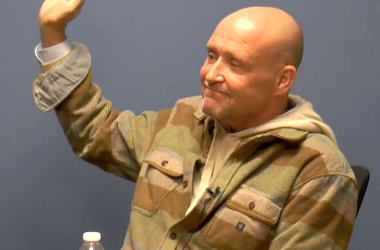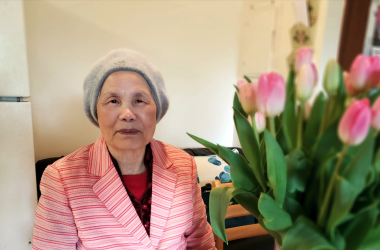Willamette University Professor Melissa Buis Michaux was supposed to be at an election night party, but decided to skip it when the results started to roll in.
“I felt so nervous I stayed at home,” she said.
Her former students Niki Kates and Riley Burton watched eagerly online from Riley’s apartment in California as votes on Oregon’s ballot initiatives were published.
Anthony Pickens, their colleague and a former prisoner of the Oregon State Penitentiary, was at a Red Robin having dinner with his wife when a notification from a news app on his phone alerted him that Measure 112 was going to pass, eliminating slavery and involuntary servitude as an acceptable punishment for crime from Oregon’s 165-year old state constitution.
Pickens texted his daughter, on the East Coast.
“She was half asleep, but I let her know we made history,” he said.
Pickens, Kates, Burton and another Willamette student, Jordan Schott, were the force behind the measure which was conceived in a college class on criminal justice reform taught by Buis Michaux. Students in the class work with people incarcerated at the Oregon State Penitentiary in Salem to learn about the politics of the U.S. prison system and to address issues directly affecting inmates and their families. Schott came up with the idea to rid the state constitution of the slavery exemption, and the others rallied around it.
Many outsiders thought it was a long shot.
“There were a lot of people who really didn’t take us seriously and who didn’t believe we could do this,” Kates said. “This legislation is brought to you by a bunch of kids and people who the state gave up on.”
In Colorado, a similar ballot measure went to voters twice before it was approved, and in the lead up to Oregon’s vote, a number of political candidates seemed to be rallying voters around tough on crime and punishment messages.
Buis Michaux, a professor of politics, policy and law at Willamette for 20 years, said she’s had remarkable students over the years but none who had such an impact.
Have I ever had students that have done this before? No, not that changed the state constitution.
– Melissa Buis Michaux, professor of politics, policy and law at Willamette University
Class project
In the spring of 2020, Schott, then 21, was in Buis Michaux’s class considering a final project. The last third of the semester of the class is dedicated to focusing on the consequences of mass incarceration — the U.S. incarcerates more people per capita than any other country — and Schott was interested in taking on the slavery exception in Oregon’s constitution. Approved in 1857, the constitution banned slavery and involuntary servitude except as a punishment for crime. The same loophole is in the 13th Amendment, passed by Congress in 1865.
Pickens, an inmate at the state penitentiary, was a facilitator in Buis Michaux’s class that semester, helping students with final projects and collaborating in class discussions.
Pickens’ journey to Buis Michaux’s class began in 1997, when he was convicted of the murder of Chad Render, a 20-year old Portland State University student, during an attempted robbery. Pickens was 15. He was sentenced to life, with a 29-year minimum.
He was transferred to several Oregon prisons during his time inside, but spent the last three at the Oregon State Penitentiary, helping the Reforming Criminal Justice class.
At the time, Pickens was president of Uhuru Sasa, an African American cultural organization founded in the prison in 1968. Its members wanted to help with Schott’s project.
In prisons, slavery is real, whether people admit it or not, it’s real.
– Anthony Pickens, OASIS member, policy and outreach associate for the Oregon Justice Resource Center and a former inmate at the Oregon State Penitentiary
Schott tapped Kates and Burton, Willamette students who had taken Buis Michaux’s class before her, and they started working together with Pickens and members of Uhuru Sasa on a bill.
The Uhuru Sasa members came up with a name for the project: Oregonians Against Slavery and Involuntary Servitude, or OASIS. One of Kates’ friends helped design a logo. They were unable to finish the project by semester’s end, but continued working together.
“We had extremely high hopes at the time,” Pickens said.
They spent the next year and a half lobbying the Legislature to approve a bill for referral to the ballot. Two Black senators – James Manning, D-Eugene, and Lew Frederick, D-Portland – and Sen. Rob Wagner, D-Lake Oswego, signed on as chief sponsors.
Burton said pushing the bill through the Senate Judiciary Committee was sometimes excruciating.
“We were just 100% sure some background figure had removed it from the possibility of being in a committee,” Burton said.
There’d be these moments of traction, where it seemed to be doing really well in committees, then it would just stop.
– Riley Burton, OASIS member
Some legislators were concerned that banning slavery and involuntary servitude as a punishment would prevent incarcerated people from taking jobs that can help reduce their sentences, or perform community service offered as an alternative to prison time.
The group tweaked the language to ensure that work accepted voluntarily to reduce a sentence or defer incarceration was not considered indentured servitude.
While working on the project, Pickens was pardoned by Gov. Kate Brown. His sentence was commuted in December 2021 after serving 24 years.
Pickens said that the OASIS work was critical.
I spent 24 years incarcerated and working for pennies an hour. Then, coming out of prison and not being able to have anything to show for it.
– Anthony Pickens
“This meant something, as an African American man and as someone who has lived experience inside the institution, it meant a lot,” he said. “I spent 24 years incarcerated and working for pennies an hour. Then, coming out of prison and not being able to have anything to show for it. No Social Security even though I worked for 24 straight years for (the Department of Corrections).”
On June 24, the Oregon State Legislature approved a resolution in a bipartisan vote – with 76 in favor and 11 Republicans opposed – to send the constitutional amendment to voters in the November election.
After that, the students met once a week with each other and once a week with the prisoners. They hired a campaign manager, established a political action committee called Oregonians United to End Slavery and raised nearly $133,000 to reach voters with their campaign.
The vote
Measure 112 passed with 55.6% in favor and 44.4% against. It didn’t face much formal opposition, but the Oregon State Sheriff’s Association filed a statement with the Secretary of State’s Office against it, saying it would create unintended consequences, such as limiting work opportunities for reduced sentences, and work and community service options as deferral for a prison sentence — the very provisions the measure’s authors had addressed as it moved through the Legislature.
Buis Michaux said she was worried in the weeks leading up to the vote.
“There was a push by a number of candidates for a return-to-law-and-order-through-punishment strategy,” she said. She read Facebook posts where people called on Oregonians to oppose all ballot measures.
“I was surprised that we didn’t lose,” Pickens said. “Oregon has an extremely racist history when it comes to Black exclusion laws and stuff happening in criminal justice. Voters proved that again when you look at how this worked out and how close it got getting this passed.”
When the group got started in 2020, there were nationwide uprisings, calling for criminal justice reform and a reckoning with racism and police violence following the murder of George Floyd by police in Minnesota.
“If you would have asked us two-and-a-half years ago if we thought it was going to pass this narrowly, we would have thought it would have had a much wider margin,” Kates said.
By the November election, it seemed those public calls for change had dwindled.
“We were really aware of a very strong pivot to a kind of tough-on-crime rhetoric that was starting to happen,” she said.
Now that the bill has passed, state officials need to figure out the ramifications. The Oregon Department of Corrections has informed prisons that prisoners will continue working in assigned jobs. Some laws need to be revised to address issues around unpaid or low-paid work by inmates.
“Now that we’ve gotten a significant number of Oregon voters to pass this, it’s on people’s minds,” Burton said. “Many didn’t know that this was legal for a long time. We want to capitalize on that attention.”
OASIS members both inside and outside of the Oregon State Penitentiary continue to meet and to discuss ways in which they can improve conditions for the incarcerated. How inmates are treated on the inside is an important component of successful transformation and ultimately reintegration into society, Buis Michaux said.
The work continues
Today, Burton is in his first year of law school at Stanford University. Kates is in her first year of law school at the University of California, Berkeley, and Schott works with U.S. Sen. Jeff Merkley’s office as a legislative correspondent. Pickens is a policy and outreach associate for the nonprofit Oregon Justice Resource Center.
Pickens and Buis Michaux still work closely with incarcerated individuals in the state penitentiary.
“Sitting in a cell you never think you can accomplish something such as this,” Pickens said.
But the story of Measure 112’s passage had inspired hope among many of the people he and Buis Michaux work with on the inside, according to both.
“It’s important for the public and for those currently incarcerated to understand that no matter what position you are in, if you put your mind forward, and the individuals around you can fuel those ideas and those thoughts, anything is possible,” Pickens said.
Oregon Capital Chronicle is part of States Newsroom, a network of news bureaus supported by grants and a coalition of donors as a 501c(3) public charity. Oregon Capital Chronicle maintains editorial independence. Contact Editor Lynne Terry for questions: [email protected]. Follow Oregon Capital Chronicle on Facebook and Twitter.
STORY TIP OR IDEA? Send an email to Salem Reporter’s news team: [email protected].

Alex Baumhardt has been a national radio producer focusing on education for American Public Media since 2017. She has reported from the Arctic to the Antarctic for national and international media, and from Minnesota and Oregon for The Washington Post. She previously worked in Iceland and Qatar and was a Fulbright scholar in Spain where she earned a master's degree in digital media. She's been a kayaking guide in Alaska, farmed on four continents and worked the night shift at several bakeries to support her reporting along the way.









